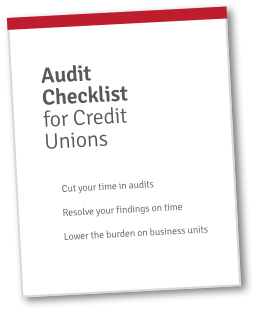If you answered, “very well, thank you,” that’s great! Not only is it a polite response, but it says a lot about your confidence in the audit process. Any lingering stress subsides with the knowledge that everybody involved accomplished their tasks perfectly: no missing pieces, no inconsistent answers, clear and proper documentation, all turned in on time. It’s official: you’re a master of NCUA regulations.
If you answered, “I couldn’t sleep,” or “I got there eventually,” there’s no need to panic (yet). Perhaps you’re not quite as confident as the person above. Maybe stress takes more time to exit your body. Maybe, just maybe, you’re aware of how many little things there are to keep track of, and how much effort goes into submitting precisely what your auditor asked for.
Group Projects, Anyone?
In college, too many classes required group projects. In many regards, they were a good learning opportunity. It forced several people to work together, communicate, meet deadlines together, and stay on the same page. Collaborative effort was a teaching point engineered by savvy professors to prepare students for real-world group project applications.They were horrible.
Audits are very similar.
One of the first things any credit union must do when facing an audit is to put together a team of experts to address particular parts of the initial letter. Each member of the team can complete their portion of the project and turn it in. After finishing, each team member might clap the dust off their hands, go to work, and forget about the whole thing.
But it doesn’t end there. Once all the documents are compiled, someone must turn them in. Whoever submits the documents can try to make the disparate sets of documents and information cohere; however, due to NCUA regulations, that can be a difficult and time-intensive task. Without open communication and systemic support, it’s very easy for things to fall through the cracks.
The final project must be cohesive. It can’t miss any parts. Any answers given to questions asked can’t contradict other answers to those same questions.
If a team doesn’t communicate well, it won’t get a good grade.
But this is the real world. If a team doesn’t get a good grade here, it doesn’t mean living with a B-. It means doing the work again until it’s right. Such is life in the era of NCUA regulations.

FREE: Audit Checklist for Credit Unions
4 key principles and 9 questions to jumpstart your audit planning. From leading credit unions.The Cost of Poor Organization
One of the major drawbacks of group projects is that you can’t control everything you’re given before turning it in. If one person’s work isn’t up to par, the whole crew gets dinged. In real-world applications such as audits, that “ding” could mean further scrutiny, request for more documentation, or regulatory action.If you fully trust every member of your team to operate and communicate effectively, this might not be an issue. However, if you have a realistic fear that miscommunications and misunderstandings happen, you may want to consider methods to ensure proper, timely, and robust collaboration among all involved parties.
In fact, you may want to know that the platform you use for organization, communication, collaboration, and submittal is secure!
If you want to take the guesswork out of the auditing process, and you want to really know what you give to your auditor, it may be time to look into some specialized auditing tools. The best way to ensure you and your team meet NCUA regulations is to work with robust software designed specifically to assist you with your audit.






